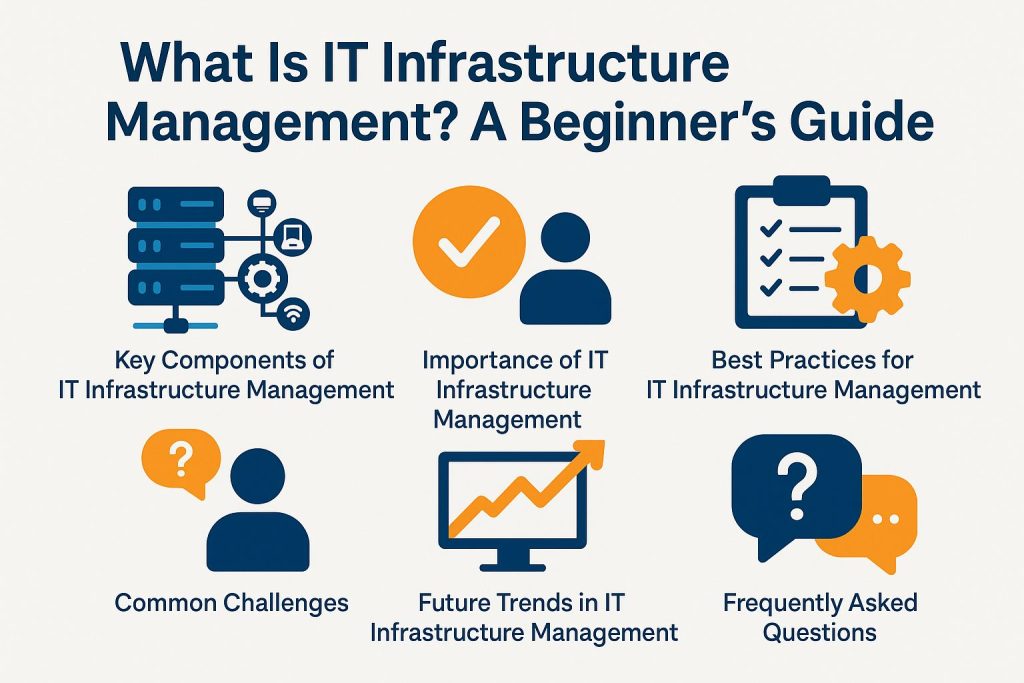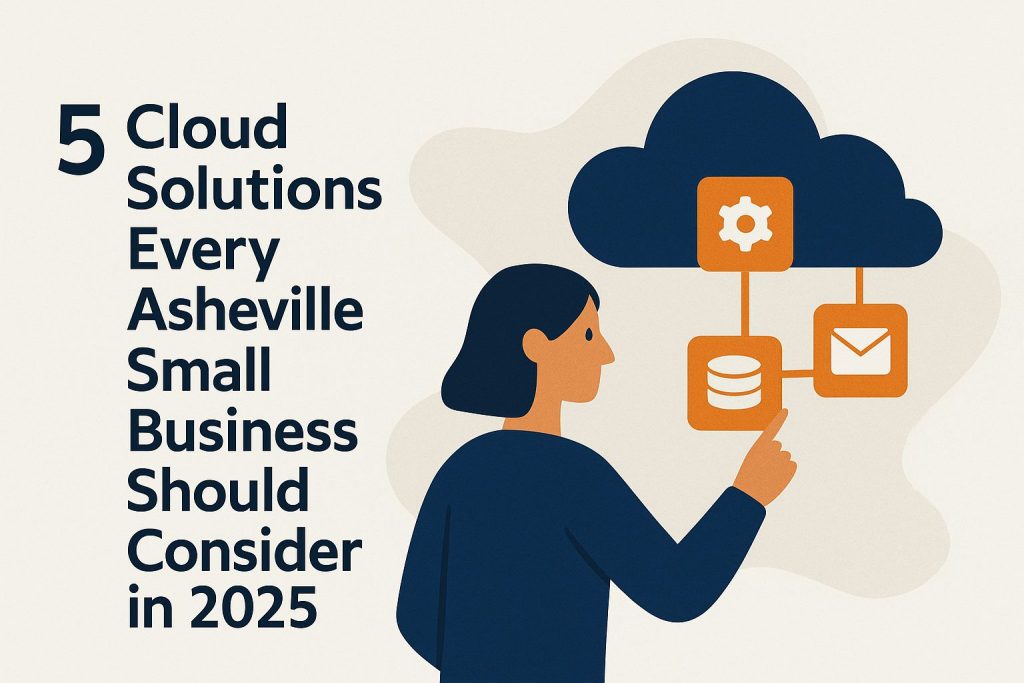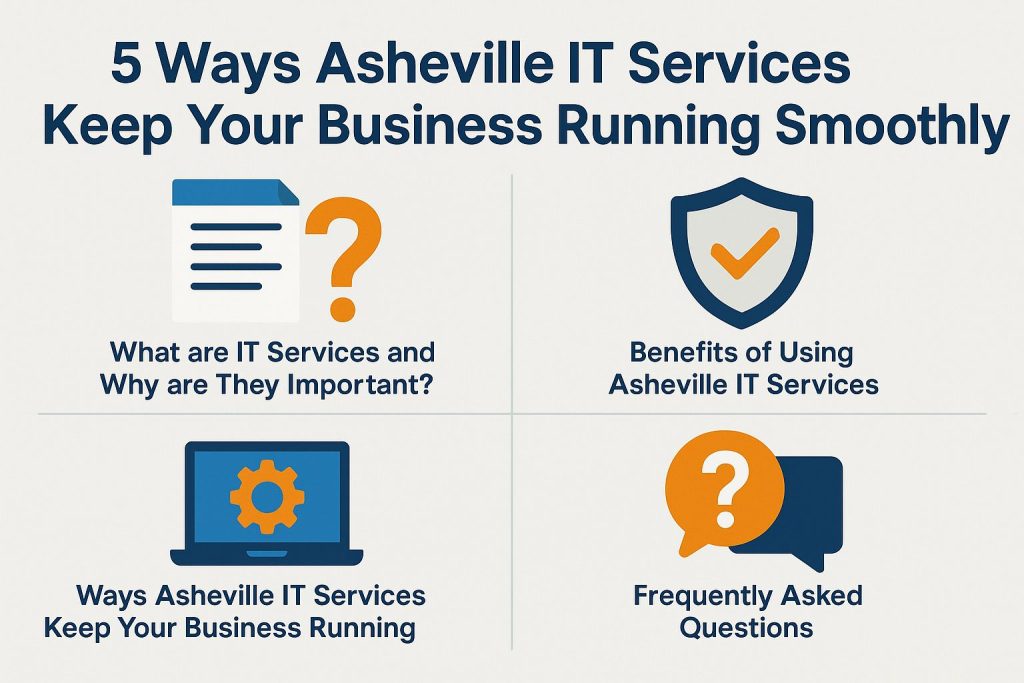The Future of IT Infrastructure in Asheville’s Business Landscape

Asheville’s IT infrastructure is changing local businesses.
This article analyzes current IT systems. It highlights their strengths and challenges. Emerging technologies are transforming the industry. This article examines trends and their benefits for Asheville’s economy. It also predicts future changes. It weighs the challenges and opportunities for local businesses.
The Current IT Infrastructure in Asheville
Asheville’s IT infrastructure is pivotal in shaping the local business landscape, especially as digital transformation accelerates. The existing infrastructure must adapt to meet the demands of emerging technology trends. These include remote work and scalability for all businesses.
With growing investments in broadband access and IT services, Asheville is establishing itself as a competitive entity in the evolving digital economy. However, the existing infrastructure must continuously adapt to meet the demands posed by emerging technology trends, such as remote work capabilities and enhanced scalability for businesses of all sizes.
Overview of Existing IT Infrastructure
The existing IT infrastructure in Asheville comprises a robust network that supports a variety of enterprise solutions, including cloud computing and managed services, which are essential for both local businesses and tech startups.
These capabilities help organizations scale operations efficiently. They use cloud solutions for data storage and processing, minimizing on-site hardware expenses. Local businesses benefit from customized managed services that improve cybersecurity and provide seamless IT support, allowing them to concentrate on their core competencies.
Strategic technology partnerships with established IT firms introduce additional expertise and innovative solutions to the region, fostering an ecosystem where companies can collaborate and share resources. This collaborative environment ultimately enhances the overall digital landscape in Asheville.
Challenges and Limitations
Despite advancements, Asheville’s IT infrastructure has challenges. Cybersecurity threats and scalability issues affect local businesses competing globally.
The local economy is increasingly reliant on technology; however, many small and medium-sized enterprises encounter difficulties in investing in the robust cybersecurity measures essential for safeguarding sensitive data against evolving threats. Additionally, the scalability of current IT solutions often proves inadequate, preventing businesses from effectively meeting growing demands. Worth exploring: Integrating IT Services for Seamless Business Operations can offer strategies to tackle these scalability and security issues.
The digital divide complicates matters. Underserved communities lack access to reliable internet. This creates economic disparities and impacts digital literacy.
To address these issues, Asheville needs substantial investments in infrastructure and community education. This will foster a more secure and competitive environment, helping businesses thrive in an interconnected world.
The Impact of Emerging Technologies
Emerging technologies are changing Asheville’s IT landscape. They influence how local businesses operate and innovate.
The integration of IoT applications, artificial intelligence, machine learning, and other technological trends has led to a growing adoption of digital transformation strategies among businesses, aimed at enhancing operational efficiency and customer engagement.
These technologies are not simply trends; they are essential components in cultivating a resilient business ecosystem in Asheville, allowing companies to remain competitive in an ever-evolving marketplace. For an extensive analysis of how IT services can optimize these integrations, our comprehensive guide on integrating IT services for seamless business operations provides valuable insights.
Trends in IT Infrastructure

Current IT trends in Asheville show a shift to hybrid solutions, automation, and edge computing. This reflects the larger move to cloud security and advanced technologies.
This transition helps local enterprises optimize operations. They can use both on-premise and cloud services. This provides more flexibility and scalability.
Organizations recognize the need for real-time data processing. This need drives them towards edge computing.
These trends improve operational efficiency. They also require strong cloud security to protect sensitive information.
As organizations navigate this evolving landscape, they focus more on technological integration. This ensures they remain competitive in an ever-changing digital environment.
Potential Benefits for Businesses in Asheville
Businesses in Asheville can benefit from emerging technologies. These benefits include better operational efficiency, improved disaster recovery, better customer relationship management, and advanced business intelligence.
By using tools like cloud computing, artificial intelligence, and data analytics, local enterprises can streamline operations. This speeds up processes and cuts costs.
These technologies help businesses gain insights from customer data. This supports personalized marketing and improves customer interactions. Improved communication channels and digital platforms make customer engagement more dynamic and responsive.
As a result, businesses gain a competitive edge. They also build stronger relationships with clients, leading to sustainable growth in a changing market.
Predictions for the Future of IT Infrastructure in Asheville
The future of IT infrastructure in Asheville looks bright. Forecasts show more technology innovation will create a sustainable and efficient IT ecosystem. This supports workforce development, remote work, and local economic growth.
As businesses adapt to the digital economy, they need essential upgrades and investments in infrastructure. This ensures resilience and helps maintain a competitive edge in the marketplace.
The integration of advanced technologies will further solidify Asheville’s status as a hub for both tech startups and established enterprises.
Expected Changes and Developments
Changes in Asheville’s IT infrastructure will likely include moving to advanced technology platforms. There will also be upgrades focused on IT governance and compliance.
This move will streamline operations, enhance data security, and improve efficiency. To achieve these goals, the city will focus on adopting cloud solutions. These solutions offer scalability and adaptability to evolving demands.
Building strong IT governance frameworks is essential. These frameworks will guide data management, risk assessment, compliance, and project management. They ensure that all stakeholders align with the city’s goals.
By creating a governance structure, Asheville can manage its IT assets better. This helps optimize resource allocation and monitor new technologies’ effectiveness, fostering a more resilient and innovative IT environment.
Potential Challenges and Opportunities

The future of IT infrastructure in Asheville offers many opportunities for growth and innovation. However, there are challenges, especially in technology leadership and maintaining business continuity with changing regulations.
As businesses integrate new technologies, they may face challenges. These include needing a skilled workforce, rising implementation costs, and complex data security issues.
To address these challenges, strong leadership and strategic planning are needed.
Overcoming these challenges can significantly improve efficiency and customer engagement. The local IT landscape gives organizations a unique chance to innovate. It also promotes collaboration and expands market presence, contributing to regional economic growth.
Frequently Asked Questions (FAQs)
What is IT infrastructure? Why is it important for Asheville’s businesses?
IT infrastructure includes hardware, software, and network systems. These are used to manage and deliver information in an organization.
How is the future of IT infrastructure shaping up in Asheville’s business landscape?
The future of IT infrastructure in Asheville is always changing. It adapts to new technologies and trends. This includes more cloud computing, mobile devices, and the Internet of Things. It also requires strong cybersecurity to protect sensitive data.
What role does reference data play in the future of IT infrastructure in Asheville’s business landscape?

Reference data includes industry standards and best practices. It is crucial for developing and maintaining strong IT infrastructure.
How can businesses in Asheville prepare for the future of IT infrastructure and technology adoption?
To prepare for the future, Asheville businesses should learn about new technologies and trends. This includes smart technology and remote infrastructure. Investing in employee training is crucial. Regularly assess and update IT systems to keep them efficient and secure. This promotes sustainability and resilience.
What are some potential challenges that businesses in Asheville may face with the future of IT infrastructure and infrastructure investment?
Businesses in Asheville may face challenges with future IT infrastructure. These include keeping up with changing technologies, addressing cybersecurity threats, managing IT costs, and implementing hybrid models for better security.
How can businesses in Asheville stay competitive in the ever-changing landscape of IT infrastructure and digital workplace?
To stay competitive, Asheville businesses should invest in cutting-edge technology and infrastructure. This includes consulting services and IT support. Staying agile and adaptable helps businesses. Using data analytics can improve customer experience and service scalability. This keeps them at the forefront of technology.




